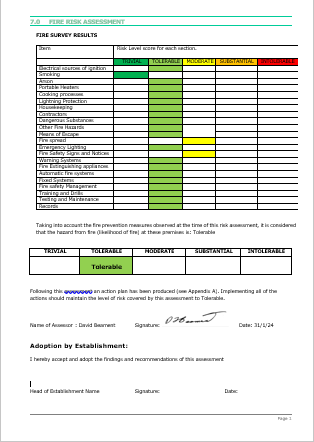Fire Risk Assessment in Schools and Colleges
School Fires in England - 2024/25 financial year
There were:
- 315 fires on school premises:
- 106 fires in secondary schools;
- 209 fires in nurseries, infant and primary schools;
- 41 of the fires in schools were deliberately started.
Source:Department of Housing, Communities and Local Government
The key to successfully managing fire hazards in schools and colleges is the completion of a fire risk assessment by a competent person. To be deemed competent the fire risk assessor would need to be able to demonstrate that they have an appropriate level of knowledge of fire safety management, and importantly experience of undertaking fire risk assessments of educational premises. Once the school's fire risk assessment documentation is completed, schools must ensure that the identified control measures are fully implemented. This will ensure adequate protection of their people, premises and assets , as well as fire service personnel should a fire actually start. Our fire risk assessors all have extensive experience of undertaking fire risk assessments of educational premises . They will happily offer advice & guidance to the establishment's responsible person and other staff on how to practically implement the identified physical protection & management control measures.
The Regulatory Reform (Fire Safety) Order 2005 (RRFSO) requires the employers of educational premises to undertake fire risk assessments for their schools. The primary focus of the RRFSO is to ensure the life safety of people. In addition to this critical issue, our fire risk assessors will also consider the business continuity risks for the premises. This is important if you wish to reduce the potential for total loss/damage to the remainder of the buildings in the event of a fire. To conduct the fire risk assessment of your school or college buildings, a fire risk assessor will need to visit your premises. They will undertake a comprehensive evaluation of the buildings looking at all areas of fire safety and fire risk. The fire risk assessment process will involve a consultation period with the education premise's manager. This will determine the existing outline standard of fire risk management in the workplace. A pre-inspection letter will be sent before the visit date to enable you to gather the necessary information required by the fire risk assessor.
After examining the school or college's documentary evidence, there will be a physical inspection of the school building to look at and identify/confirm all of the points below:

- Educational Property's age & occurring ;
- People at risk in the event of a fire occurring at the premises (e.g. staff, students, visitors & contractors);
- Potential fire safety hazards and risk - ignition sources & combustible materials;
- Fire prevention & management;
- Fire safety signage;
- Fire safety equipment & maintenance;
- Fire safety training & fire evacuation drills;
- Means of escape in the event of fire;
- Deficiencies in the premise's existing fire safety & risk precautions;
- An evaluation of the school's existing emergency fire procedures, training provided to staff & drills.
If you would like to know more about the above topics or school fire risk assessments in general please see the What is a fire risk assessment? question in our FAQ section for a more detailed explanation.
The inspection element of the school's fire risk assessment is normally a non-intrusive survey of the building(s), but it will also consider if a more detailed intrusive survey is required. If the fire risk assessor deems that an intrusive survey will be required they will discuss it with you whilst on site. Issues which might contribute to the need for an intrusive survey include the age of the property and the buildings' construction methods. In most cases additional intrusive surveys are not needed for educational premises.
The School's Fire Risk Assessment Report will be emailed to you upon completion in the form of a PDF. The Report will include the Fire Risk Assessment and a Fire Action Plan for the School or College to adopt. The adoption of the assessment is a vital stage in turning the assessor's report into the school's own fire risk assessment. Effectively managing fire safety is critical to everyone's safety. We therefore always provide the opportunity to discuss the findings of the school's fire risk assessment with the fire risk assessor in detail to ensure complete understanding of its findings and recommendations.
Reviewing a School's Fire Risk Assessment
Like all of the school's other risk assessments, fire risk assessments are legally required to be "regularly" reviewed. Generally fire safety professionals would interpret "regularly" to mean that the fire risk assessment is being reviewed annually. As with most things in life there are exceptions, in this case these would relate to "significant changes" to the building's structure which would adversely impact its compartmentation; or to the activities that are taking place (or changes to the location within the building where existing ones are undertaken). A significant change which could impact the building's fire integrity or the introduction of new ignition or fuel sources would require a more urgent review of the assessment. Reviewing of the fire risk assessment does not necessarily mean that schools always have to pay for an external contractor to undertake the review. If there have not been any significant changes then a local review by the school's staff will be sufficient. The school should ensure that the existing fire safety controls are still in place and effective (remember to record the review outcome and date on the fire risk assessment). As things do change with time, and the staff working in an environment can be "blind" to such changes, we would recommend that schools do utilise the services of external assessors every few years to ensure their fire risk assessment remains suitable and sufficient.
oneSource offers a number of complimentary services which may prove useful once your school begins to implement the report's findings:
